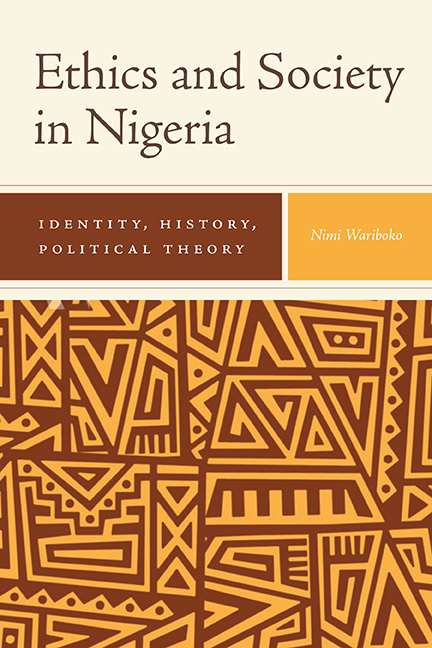Book contents
- Frontmatter
- Dedication
- Contents
- Foreword
- Preface
- Acknowledgments
- Introduction: Dead Gods, Divine Kings, and Deadly Politicians
- 1 The Emergence of the Lotus-Self: Personhood and Identity
- 2 Dead Gods and People's Revolts: Political Theory in Religious Acts
- 3 The Divine King and His Five Bodies: Living History and the Logic of Interreligious Dialogue
- 4 Governance and Deadly Politicians: History as Cultural Criticism
- 5 History without Force: Finding Present Space and Place of Time
- 6 Constructing Nigeria's Greatness: Neglected Paths of Community, Narratives, and Care of the Soul
- 7 Mythos, Virtues, and National Transformation: The Search for a Standard of Citizenship Moral Behavior
- 8 African Traditional Religion and Critical Theory: A Framework for Social Ethics
- Notes
- Bibliography
- Index
8 - African Traditional Religion and Critical Theory: A Framework for Social Ethics
Published online by Cambridge University Press: 03 September 2019
- Frontmatter
- Dedication
- Contents
- Foreword
- Preface
- Acknowledgments
- Introduction: Dead Gods, Divine Kings, and Deadly Politicians
- 1 The Emergence of the Lotus-Self: Personhood and Identity
- 2 Dead Gods and People's Revolts: Political Theory in Religious Acts
- 3 The Divine King and His Five Bodies: Living History and the Logic of Interreligious Dialogue
- 4 Governance and Deadly Politicians: History as Cultural Criticism
- 5 History without Force: Finding Present Space and Place of Time
- 6 Constructing Nigeria's Greatness: Neglected Paths of Community, Narratives, and Care of the Soul
- 7 Mythos, Virtues, and National Transformation: The Search for a Standard of Citizenship Moral Behavior
- 8 African Traditional Religion and Critical Theory: A Framework for Social Ethics
- Notes
- Bibliography
- Index
Summary
Where does the past come from? It comes from the future: a meaningless trace, symptom is retroactively given a meaning when it is incorporated, placed into the symbolic network, the signifying framework of society.
Introduction
From the preface to the previous chapter I was like an artist walking on a tightrope, trying to juggle three balls at a time. I have juggled history, political theory, and social ethics—more precisely, tossing up and down the balls of political theory and history to give particular impressions of the social ethics and identity of the Nigerian people. The tightrope on which I walked precariously to perform my act was African traditional religion (ATR).
To use a philosophically pedigreed metaphor, I will say that ATR is like the hunchback in that famous thesis of Walter Benjamin on the relationship between historical materialism and theology.
The story is told of an automaton constructed in such a way that it could play a winning game of chess, answering each move of an opponent with a countermove. A puppet in Turkish attire and with a hookah in its mouth sat before a chessboard placed on a large table. A system of mirrors created the illusion that this table was transparent from all sides. Actually, a little hunchback who is an expert chess player sat inside and guided the puppet's hand by means of strings. One can imagine a philosophical counterpart of this device. The puppet called “historical materialism” is to win all the time. It can easily be a match for anyone if it enlists the service of theology, which today, as we know, is wizened and has to keep out of sight.
In the Judeo-Islamic-Christian-dominated worlds of present-day Africa, the concealed hunchback is theology of African traditional religion and the puppet is “critical theory.” In this book, ATR's philosophical theology has been used to guide the hands of “critical theory” by means of strings within it. Many forms of Islam and Christianity in Africa have also enlisted the services of ATR, which today is wizened enough to keep out of sight.
Whether you prefer the metaphor of the hunchback or tightrope artist, the critical role of philosophical theology of African traditional religion in framing the socio-ethical thought of this book might not be obvious to you.
- Type
- Chapter
- Information
- Ethics and Society in NigeriaIdentity, History, Political Theory, pp. 169 - 182Publisher: Boydell & BrewerPrint publication year: 2019



